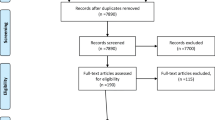Abstract
This study examined the Health Belief Model’s efficacy to predict intention to undergo genetic testing for the Colorectal Carcinoma (CRC) gene within a rural/frontier setting. Survey data were collected on 558 Southwest Montanan residents. Regression analysis revealed that perceived benefits, including affordability and satisfying curiosity, were the strongest indicators of intention to undergo genetic testing for CRC. Select consumer barriers and cues to action variables were also found to be significant predictors. Collectively the model explained approximately 36% of the variance. These preliminary findings have implications for genetic counselors, health practitioners and health care providers concerned with genetic counseling and addressing the public health issue of CRC.


Similar content being viewed by others
References
American Cancer Society. (2006, February 14, 2006). Facts and figures 2006. from https://doi.org/www.cancer.org/docroot/STT/stt_0.asp.
Babbie, E. (2002). The basics of social research. Belmont: Wadsworth Group.
Bosompra, K., Flynn, B. S., Ashikaga, T., Rairikar, C. J., Worden, J. K., & Solomon, L. J. (2000). Likelihood of undergoing genetic testing for cancer risk: a population-based study. Preventive Medicine, 30, 155–166.
Bunn, J. K., Kwadwo, B., Takamaru, A., Flynn, B. S., & Worden, F. (2002). Factors influencing intention to obtain a genetic test for colon cancer risk: a population-based study. Preventive Medicine, 34, 567–577.
Church, G. M. (2006). Genomes for ALL. Scientific American, 47–54. https://doi.org/rep.med.harvard.edu/pdf/Church05s.pdf.
Dillman, D. A. (2000). Mail and internet surveys: The tailored design method (2nd ed.). New York: Wiley.
Frank, D., Swedmark, J., & Grubbs, L. (2004). Colon cancer screening in African American women. The Association of Black Nursing Faculty, 15(4), 67–70.
Green, L. & Kreuter, M. (1999). Health promotion planning: An educational and ecological approach (3rd ed.). Mountain View: Mayfield.
Gwyn, K., Vernon, S. W., & Conoley, P. M. (2003). Intention to pursue genetic testing for breast cancer among women due for screening mammography. Cancer Epidemiology Biomarkers & Prevention, 12, 96–102.
Hartman, K. A. (2002). Health belief model and it’s application to mammography screening in a K-12 school district employee wellness program. Bozeman: Montana State University.
Helmes, A. W., Bowen, D. J., Bowden, R., & Bengel, J. (2000). Predictors of participation in genetic research in a primary care physician network. Cancer Epidemiology, Biomarkers & Prevention, 9, 1377–1379.
Ho, S. M., Ho, J. W., Chan, C. L., Kwan, K., & Tsui, K. (2003). Decisional consideration of hereditary colon cancer genetic test results among Hong Kong Chinese adults. Cancer Epidemiology, Biomarkers & Prevention, 12, 426–432.
Janz, N., Champion, V., & Strecher, V. (2002). The health belief model. In K. Glanz, B. Rimer & F. Lewis (Eds.), Health behavior and health education: Theory, research and practice. San Francisco: Jossey-Bass.
Keefer, C. M. (1999). Briding the gap between life insurer and consumer in the genetic testing era: the RF proposal. Indiana Law Journal, 74(4), 1375–1397.
Peterson, S. K. (2005). The role of the family in genetic testing: theoretical perspectives, current knowledge, and future directions. Health Education and Behavior, 32(5), 627–639.
Ramsey, S. D., Wilson, S., Spencer, A., Geidzinska, A., & Newcomb, P. (2003). Attitudes towards genetics screening for predisposition to colon cancer among cancer patients, their relatives and members of the community. Community Genetics, 6, 29–36.
Strecher, V. J. & Rosenstock, I. M. (1997). The health belief model. San Francisco: Jossey-Bass.
U.S. Department of Energy Office of Science, Office of Biological and Environmental Research, & Program, H. G. (2004). Human Genome Project Information. In.
U.S. Department of Health and Human Services, & National Cancer Institute. (2007). Understanding Genetic Testing: Access Excellence Resource Center.
Acknowledgements
This study was supported in part through a research development grant from the Department of Health and Human Development at Montana State University Bozeman.
Author information
Authors and Affiliations
Corresponding author
Rights and permissions
About this article
Cite this article
Cyr, A., Dunnagan, T.A. & Haynes, G. Efficacy of the Health Belief Model for Predicting Intention to Pursue Genetic Testing for Colorectal Cancer. J Genet Counsel 19, 174–186 (2010). https://doi.org/10.1007/s10897-009-9271-7
Received:
Accepted:
Published:
Issue Date:
DOI: https://doi.org/10.1007/s10897-009-9271-7




